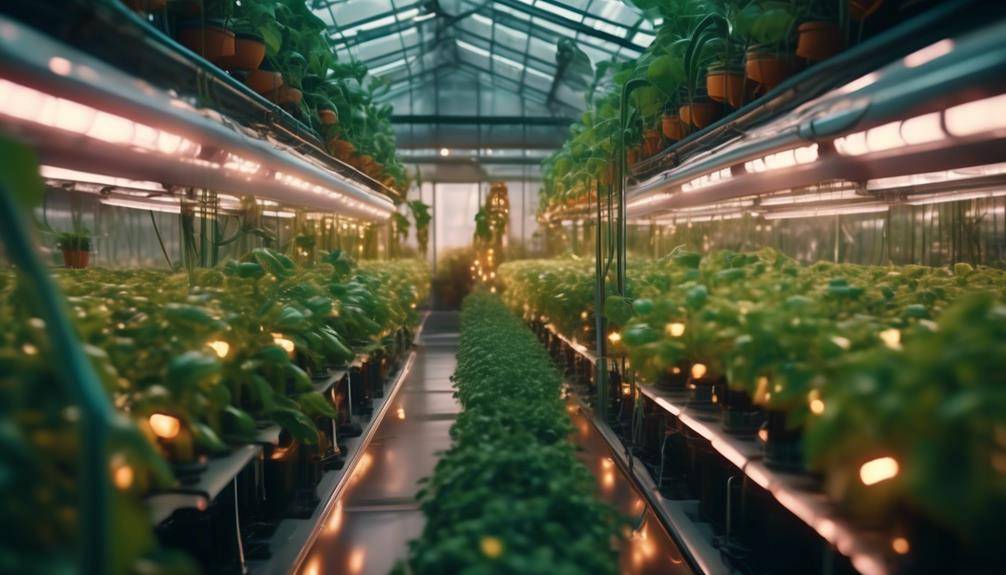Amazing Genomics Shaping Of Future Food Trends

Genomics Shaping Of Future Food Trends; Are you ready to witness a groundbreaking revolution in the world of food? Genomics, the study of an organism’s entire DNA sequence, is set to shape future food trends in ways you can’t even begin to imagine. From enhancing crop resilience and disease resistance to improving the nutritional value of our food, genomics has the potential to transform the way we grow and consume our meals. But that’s not all – it’s also paving the way for adapting crops to challenging environments and revolutionizing livestock production. Intrigued? Well, get ready to step into a world where science and innovation converge to create a future of sustainable and nutritious food.
Enhancing Crop Resilience and Disease Resistance
Enhancing crop resilience and disease resistance plays a crucial role in ensuring the future sustainability and productivity of agriculture. As the global population continues to grow at an unprecedented rate, it is imperative that we find ways to increase crop yield and develop sustainable farming practices. By utilizing genomics, scientists are able to delve deeper into the genetic makeup of crops, identifying key traits that contribute to their resilience and disease resistance.
One way genomics is enhancing crop resilience is through the identification of genes that control stress responses. By analyzing the DNA of different crop varieties, scientists can pinpoint specific genes that help plants withstand harsh environmental conditions such as drought, heat, and salinity. This information can then be used to develop crops that are better equipped to thrive in challenging environments, ultimately leading to increased yield and productivity.
In addition to stress tolerance, genomics is also playing a crucial role in the identification and understanding of disease resistance genes. Plant diseases are a major threat to crop production, resulting in significant yield losses worldwide. Through genomics, scientists can identify the genes responsible for disease resistance and develop crops that are better equipped to fend off pathogens. This not only reduces the reliance on chemical pesticides but also promotes sustainable farming practices by minimizing environmental impact.
Improving Nutritional Value of Food
As we continue to explore the advancements in genomics, the focus now shifts towards improving the nutritional value of food. Nutritional fortification and the development of functional foods are two key areas where genomics plays a crucial role in enhancing the nutritional content of our diet.
Nutritional fortification involves adding essential nutrients to food products to address nutrient deficiencies in the population. Genomic technologies can help identify the specific nutrient needs of different populations based on their genetic makeup. By analyzing the genetic variations associated with nutrient metabolism, scientists can develop fortified foods that are tailored to individual needs. For example, individuals with certain genetic variations may require higher levels of specific vitamins or minerals. Genomics enables us to identify these variations and develop fortification strategies accordingly, ensuring that individuals receive the nutrients they need.
Functional foods, on the other hand, are foods that provide additional health benefits beyond their basic nutritive value. Genomics helps in the identification of bioactive compounds present in food that can promote health and prevent diseases. By studying the genetic makeup of organisms, scientists can identify the genes responsible for the production of these bioactive compounds and manipulate them to increase their levels in food. This allows for the development of functional foods with enhanced health benefits, such as foods enriched with antioxidants, omega-3 fatty acids, or probiotics.
Adapting Crops to Challenging Environments
To address the challenges posed by difficult environments, crop adaptation strategies are being developed using genomic techniques. With climate change leading to more frequent droughts and increasing urbanization, the need for crops that can thrive in challenging conditions has become paramount. Genomic research is playing a crucial role in developing drought-resistant crops and promoting sustainable urban farming practices.
Drought-resistant crops are designed to withstand prolonged periods of limited water availability, ensuring food production in regions prone to drought. By using genomic techniques, scientists can identify genes responsible for drought tolerance and introduce them into crop plants. This allows the plants to maintain their productivity even in water-stressed conditions. Through genetic modification or selective breeding, crops can be adapted to have deep root systems, increased water-use efficiency, and improved stress tolerance mechanisms.
Urban farming, on the other hand, is a solution to the limited availability of arable land in urban areas. By utilizing rooftops, vertical spaces, and hydroponics, urban farming maximizes food production in limited spaces. Genomic techniques can be employed to develop crops that are well-suited for urban environments. These crops can be tailored to grow in small spaces, have shorter growth cycles, and be resistant to pests and diseases commonly found in urban settings.
Revolutionizing Livestock Production
Genomic advancements are revolutionizing livestock production by optimizing breeding strategies and enhancing animal health and productivity. This is achieved through the application of genetic modification techniques, which allow for targeted changes in an animal’s genetic makeup to improve desired traits. These advancements have a significant impact on the future of sustainable agriculture by addressing the challenges faced by the livestock industry and ensuring the production of healthy, efficient, and resilient animals.
- Enhanced breeding strategies: Genomic tools enable farmers and breeders to select animals with desirable genetic traits, such as disease resistance, improved feed conversion, and increased meat quality. By identifying these traits at an early stage, breeders can make informed decisions regarding mating choices, leading to faster genetic improvement and more efficient production systems.
- Improved animal health: Genomic research has provided valuable insights into the genetic basis of various diseases affecting livestock. By identifying specific genetic markers associated with resistance or susceptibility to diseases, breeders can selectively breed animals with enhanced disease resistance. This reduces the need for antibiotics and other medications, promoting healthier animals and reducing the risk of disease outbreaks.
- Increased productivity: Genetic modification techniques allow for the introduction of desirable traits, such as increased milk production or faster growth rates, into livestock populations. This leads to higher productivity and greater efficiency in meat, milk, and egg production, meeting the growing demand for animal-derived products while minimizing resource usage.
- Environmental sustainability: By improving the efficiency of livestock production, genomic advancements contribute to sustainable agriculture. Increased productivity means that fewer animals are required to meet the demand for food, reducing the environmental impact associated with land use, water consumption, and greenhouse gas emissions. Additionally, breeding for disease resistance reduces the need for medical interventions, further minimizing the use of antibiotics and chemicals in animal agriculture.
Transforming the Way We Grow and Consume Food
The advancements in genomics have not only revolutionized livestock production, but they are also transforming the way we grow and consume food. Genomics is playing a crucial role in developing sustainable farming practices and exploring alternative protein sources to meet the growing global demand for food.
Sustainable farming practices are essential for preserving the environment and ensuring long-term food security. Genomics allows us to understand the genetic makeup of crops and animals better, enabling the development of more resilient and productive varieties. By identifying genes responsible for drought resistance, disease tolerance, and nutrient efficiency, scientists can breed crops that require fewer resources and are more adapted to specific environmental conditions. This not only reduces the environmental impact of agriculture but also increases the efficiency of food production.
In addition to sustainable farming practices, genomics is also driving the exploration of alternative protein sources. As the global population continues to grow, traditional livestock production may struggle to meet the demand for animal-based protein. Genomics provides new opportunities for developing alternative protein sources, such as plant-based proteins, cultured meat, and insect-based products. By understanding the genetic makeup of these alternative sources, scientists can optimize their nutritional composition, improve their taste and texture, and enhance their sustainability.
Furthermore, genomics is also facilitating the development of personalized nutrition. By analyzing an individual’s genetic information, researchers can identify specific dietary requirements and tailor food recommendations accordingly. This approach has the potential to revolutionize the way we consume food, promoting better health outcomes and reducing the risk of chronic diseases.
Genomics Shaping Of Future Food Trends; Frequently Asked Questions
How Can Genomics Be Used to Enhance Crop Resilience and Disease Resistance?
Genomics can enhance crop resilience and disease resistance through crop breeding and genetic modification. By analyzing and manipulating the genetic information of plants, scientists can develop traits that make them more resistant to stressors and diseases, ensuring a more sustainable and secure food supply.
What Are Some Ways Genomics Can Be Used to Improve the Nutritional Value of Food?
Genomics can enhance the nutritional value of food in several ways. By studying the genetic makeup of crops, scientists can modify them to have higher nutrient content, leading to personalized nutrition. Additionally, genomics can contribute to sustainable agriculture practices.
How Can Genomics Help in Adapting Crops to Challenging Environments?
Genomics can assist in adapting crops to challenging environments by identifying genes that enhance stress tolerance. This allows for targeted breeding, creating crops that can thrive in harsh conditions and ensure food security.
What Are Some Ways Genomics Can Revolutionize Livestock Production?
Genomic selection and precision breeding are key ways in which genomics can revolutionize livestock production. These technologies allow for the identification and breeding of animals with desired traits, ultimately improving the efficiency and productivity of the industry.
How Does Genomics Transform the Way We Grow and Consume Food?
Genomics transforms the way you grow and consume food through genomic precision agriculture, which optimizes crop yields and reduces resource use. Consumer genomics in food production ensures healthier and personalized products, enhancing your overall well-being.
Conclusion
In conclusion, genomics is set to reshape the future of food by enhancing crop resilience and disease resistance, improving nutritional value, adapting crops to challenging environments, revolutionizing livestock production, and transforming the way we grow and consume food. With the advancements in genomic technology, scientists and researchers have the potential to address global food challenges and meet the growing demands of a rapidly increasing population. By harnessing the power of genomics, we can pave the way for a more sustainable and secure food future.








